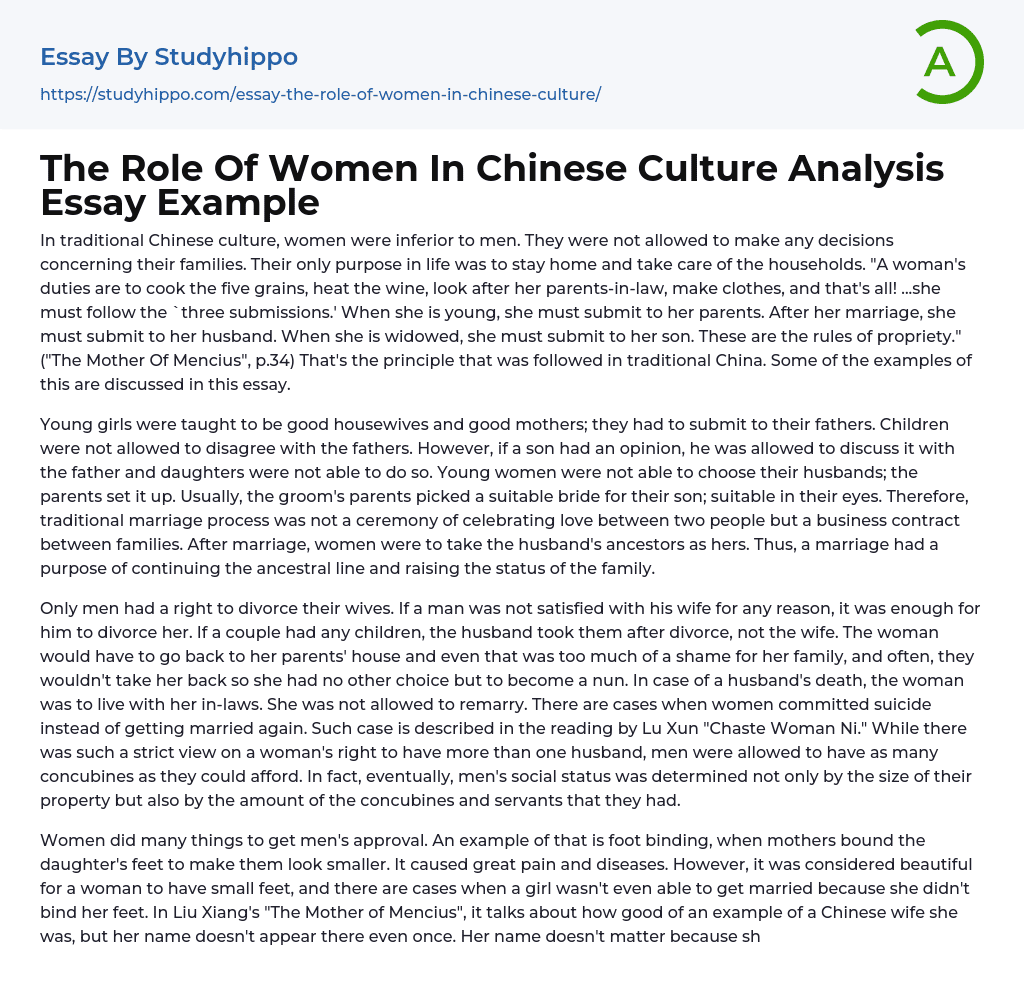In traditional Chinese culture, women were inferior to men. They were not allowed to make any decisions concerning their families. Their only purpose in life was to stay home and take care of the households. "A woman's duties are to cook the five grains, heat the wine, look after her parents-in-law, make clothes, and that's all! ...she must follow the `three submissions.' When she is young, she must submit to her parents. After her marriage, she must submit to her husband. When she is widowed, she must submit to her son. These are the rules of propriety." ("The Mother Of Mencius", p.34) That's the principle that was followed in traditional China. Some of the examples of this are discussed in this essay.
Young girls were taught to be good housewives and good mothers; they had to sub
...mit to their fathers. Children were not allowed to disagree with the fathers. However, if a son had an opinion, he was allowed to discuss it with the father and daughters were not able to do so. Young women were not able to choose their husbands; the parents set it up. Usually, the groom's parents picked a suitable bride for their son; suitable in their eyes. Therefore, traditional marriage process was not a ceremony of celebrating love between two people but a business contract between families. After marriage, women were to take the husband's ancestors as hers. Thus, a marriage had a purpose of continuing the ancestral line and raising the status of the family.
Only men had a right to divorce their wives. If a man was not satisfied with his wife for any reason, it was enough for him
to divorce her. If a couple had any children, the husband took them after divorce, not the wife. The woman would have to go back to her parents' house and even that was too much of a shame for her family, and often, they wouldn't take her back so she had no other choice but to become a nun. In case of a husband's death, the woman was to live with her in-laws. She was not allowed to remarry. There are cases when women committed suicide instead of getting married again. Such case is described in the reading by Lu Xun "Chaste Woman Ni." While there was such a strict view on a woman's right to have more than one husband, men were allowed to have as many concubines as they could afford. In fact, eventually, men's social status was determined not only by the size of their property but also by the amount of the concubines and servants that they had.
Women did many things to get men's approval. An example of that is foot binding, when mothers bound the daughter's feet to make them look smaller. It caused great pain and diseases. However, it was considered beautiful for a woman to have small feet, and there are cases when a girl wasn't even able to get married because she didn't bind her feet. In Liu Xiang's "The Mother of Mencius", it talks about how good of an example of a Chinese wife she was, but her name doesn't appear there even once. Her name doesn't matter because she is a woman; it's only there to show other women what they are supposed to be
like.
Based on these facts, we can see that women were clearly powerless in the traditional Chinese culture. In the "Letter from Feng Yen to His Brother-In-Law", the author describes what a terrible wife he has and says: "Since antiquity it has always been considered a great disaster to have one's household be dominated by a woman," which is a great illustration of how women were perceived and what role in the family and society they had.
- African American essays
- African American Culture essays
- American Values essays
- Asian American essays
- Chinese essays
- Ethnicity essays
- Ethnocentrism essays
- German essays
- Han Chinese essays
- Hispanic essays
- Identity essays
- Korean essays
- Mexican essays
- Nation essays
- Native American essays
- Race and Ethnicity essays
- White People essays
- Adoption essays
- Aunt essays
- Babies essays
- Bedroom essays
- Caring essays
- Children essays
- Daughter essays
- Divorce essays
- Dog essays
- Dysfunctional Family essays
- Family Tradition essays
- Family Values essays
- Father essays
- Foster Care essays
- Friends essays
- Grandparent essays
- Home essays
- Hometown essays
- Husband essays
- Jealousy essays
- Love essays
- Marriage essays
- Mother essays
- Online Dating essays
- Parenting essays
- Parenting Teens essays
- Parents essays
- Relationship essays
- Room essays
- Sibling essays
- Sister essays
- Wedding essays
- Wife essays




